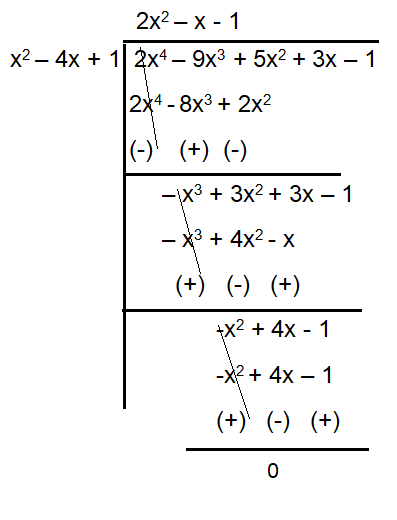FINDING REMAINING ZEROS OF POLYNOMIAL FUNCTIONS WITH GIVEN ROOTS
Subscribe to our ▶️ YouTube channel 🔴 for the latest videos, updates, and tips.
Problem 1 :
If 1 is a zero of the polynomial
p(x) = ax2 - 3(a - 1)x - 1
then find the value of 'a' and find other zero.?
Solution :
p(x) = ax2 - 3(a - 1)x - 1
Since 1 is one of the zeros of the polynomial, we can put x = 1
p(1) = a(1)2 - 3(a - 1)(1) - 1
0 = a - 3a + 3 - 1
0 = -2a + 2
2a = 2
a = 1
By applying the value of a in p(x), we get
p(x) = (1)x2 - 3(1 - 1)x - 1
p(x) = x2 - 1
Set p(x) = 0
x2 - 1 = 0
(x + 1)(x - 1) = 0
x = -1 and x = 1
So, the another zero is -1.
Problem 2 :
What number should be added to the polynomial
x2 - 5x + 4
so that 3 is the zero of the polynomial?
Solution :
Let p be the required value to be added.
p(x) = x2 - 5x + 4 + p
Since x = 3, we can apply the value of x in p(x)
p(3) = 32 - 5(3) + 4 + p
0 = 9 - 15 + 4 + p
0 = 13 - 15 + p
0 = -2 + p
p = 2
So, 2 is the value to be added.
Problem 3 :
If one of the zeros of the cubic polynomial
x3 + ax2 + bx + c is -1
then what will be the product of the other two zeros?
Solution :
Let p(x) = x3 + ax2 + bx + c
When x = -1
p(-1) = (-1)3 + a(-1)2 + b(-1) + c
p(-1) = -1 + a - b + c
0 = a - b + c - 1
a - b + c = 1
Problem 4 :
Obtain all other zeros of the polynomial
2x4 - 9x3+ 5x2 + 3x - 1
if two of its zeros are 2 - √3 and 2 + √3?
Solution :
α = 2 - √3 and β = 2 + √3
α + β = 2 - √3 + 2 + √3 ==> 4
α β = (2 - √3) (2 + √3) ==> 22 - √32
= 4 - 3
= 1
Forming quadratic equation from the sum and product of roots,
x2 - (α + β)x + α β = 0
x2 - 4x + 1 = 0

The quotient is 2x2-x-1, by factoring this quadratic polynomial, we get
2x2-x-1 = (2x + 1) (x - 1)
2x +1 = 0, then x = -1/2
x - 1 = 0, then x = 1
So, the remaining zeroes are -1/2 and 1.
Problem 5 :
Find the zeros of the polynomial
f(x) = x3 - 5x2 -2x +24
if it is given that the product of its two zeros is 12?
Solution :
Let a, b and c be zeroes of the cubic polynomial.
Sum of zeroes = - coefficient of x2/coefficient of x3
a + b+ c = -(-5)/1
a + b + c = 5 -----(1)
Product of zeroes = -constant/coefficient of x3
abc = -24/1
abc = -24
ab = 12 -----(2) (product of two of its zero)
c = -24/ab
c = -2
Applying the value of c in (1), we get
a + b - 2 = 5
a + b = 7
ab = 12
b = 12/a
Applying the value of b in a + b = 7
a + (12/a) = 7
a2 + 12 = 7a
a2 -7a + 12 = 0
(a - 3) (a - 4) = 0
a = 3 and a = 4
b = 4 and b = 3
So, the remaining zeroes are 3 and 4.
Problem 6 :
If the zeros of the polynomial f(x) = x3 – 3x2 - 6x + 8 are of the form a-b, a, a+b, then find all the zeros.
Solution :
Sum of zeroes = - (-3)/1
a - b + a + a + b = 3
3a = 3
a = 1
Product of zeroes = -8/1
a(a-b)(a+b) = -8
1(1 - b2) = -8
1 - b2 = -8
b2 = 9
b = 3, -3
If a = 1 and b = 3
a - b ==> 1 - 3 ==> -2
a = 1
a + b ==> 1 + 3 ==> 4
So, the zeroes are -2, 1 and 4.
Problem 7 :
If α, β are the two zeros of the polynomial
f(y) = y2 - 8y + a and α2 + β2 = 40
find the value of ‘a’?
Solution :
f(y) = y2 - 8y + a
α2 + β2 = 40
(α + β)2 - 2αβ = 40
Sum of zeroes (α + β) = -(-8)/1
(α + β) = 8 ----(1)
Product of zeroes (α β) = a/1
(α β) = a ----(2)
Applying the values of (1) and (2)
82 - 2a = 40
2a = 64 - 40
2a = 24
a = 12
So, the value of a is 12.
Subscribe to our ▶️ YouTube channel 🔴 for the latest videos, updates, and tips.
Recent Articles
-
Finding Range of Values Inequality Problems
May 21, 24 08:51 PM
Finding Range of Values Inequality Problems -
Solving Two Step Inequality Word Problems
May 21, 24 08:51 AM
Solving Two Step Inequality Word Problems -
Exponential Function Context and Data Modeling
May 20, 24 10:45 PM
Exponential Function Context and Data Modeling